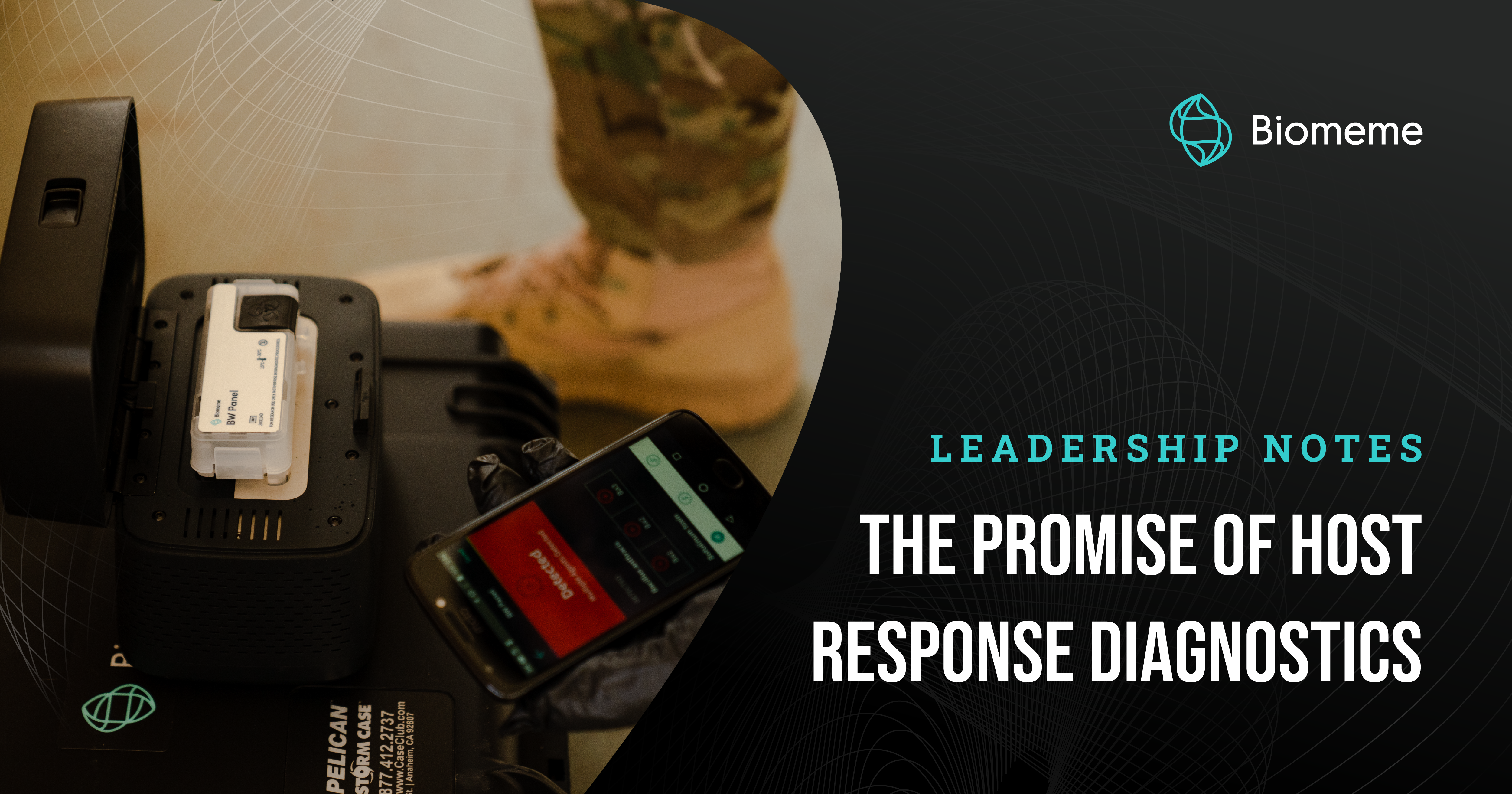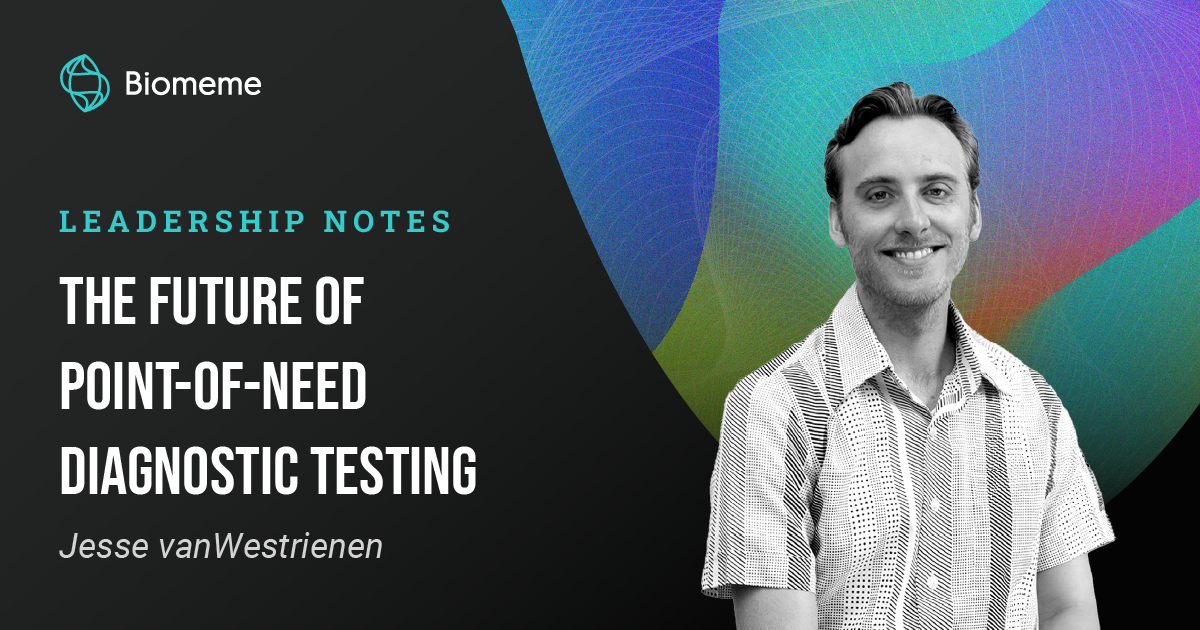
Written By: Max Perelman
It’s not hard to imagine how the next pandemic could begin: A virus spills out of the jungle, and illness is spreading on a global scale. Even as the scientific community races to understand this novel infection, it will take weeks to isolate the pathogen and develop assays to detect it.
The good news is that the scientific community is far better prepared today than when COVID erupted across the globe less than four years ago, and that preparation grows stronger every day.
In the face of emerging infectious diseases and global health crises like COVID, the ability to detect acute infections in a pathogen-agnostic manner (preferably before there are outward symptoms), understand the sepsis risk profile or severity of an individual’s illness, and then track their response to therapy is becoming increasingly crucial.
Host response diagnostics, a rapidly evolving field, holds tremendous potential for improving patient care, optimizing resource allocation, and enhancing military preparedness. By tapping into the body’s inherent response mechanisms, doctors and researchers can gain valuable insights into an individual’s sickness, their prognosis, and the appropriate course of action, even before there are outward symptoms or a specific pathogen is identified. The impact of this can not be understated.
The evolution of host response diagnostics has showcased its capability to detect viral infections prior to the onset of symptoms. This advancement in early detection can allow for prompt interventions and effective containment strategies. Currently, efforts are underway to develop threat-agnostic diagnostic tools capable of distinguishing between bacterial, viral, and fungal infections, aiding in more accurate diagnoses even in the absence of specific pathogen knowledge. However, the true potential of host response diagnostics lies in its future application: understanding the temporal dynamics of an infection, including a patient’s response to therapy.
"If a warfighter is feeling sick, can they remain in theater and complete their objective? Or do they need to fall back away from the fight? Understanding this is literally mission-critical."
In the military context, the importance of host response diagnostics cannot be overstated. Before deploying troops on critical missions, the ability to screen them for illness and assess their ability to carry out their duties without endangering others becomes mission-critical. Instead of relying solely on symptom-triggered, pathogen detection, host response diagnostics offer the opportunity to pre-screen military personnel up to 72 hours before their deployment, enabling the identification of acute infection that could compromise mission success.
During missions, if a warfighter falls ill, quickly determining the nature of the illness becomes paramount. You don’t know if the warfighter has been infected with a biowarfare agent, a novel emerging infectious disease, or one of many naturally circulating pathogens. Nevertheless, with host response-based diagnostics you can quickly identify the nature of the illness in a threat-agnostic manner, informing treatment and containment strategies.
Finally, if someone presents with an acute infection, the ability to predict disease severity, and measure the temporal dynamics of the illness’ progression to assess response to therapy is literally mission-critical: Can the warfighter complete their mission, or do they need to fall back away from the fight? Can they recuperate at Role 1 or must they be evacuated for advanced medical care at a Role 2 setting, etc. because they are likely to become severely sick and potentially develop sepsis? Knowing the severity of illness for military personnel is crucial to ensuring the protection of each soldier, their unit, and the mission’s success.
While host response-based diagnostics hold immense potential for military applications, their impact on global health is equally significant. During pandemics and other public health emergencies, the ability to manage and care for affected populations is of the highest importance. By understanding the severity of illness, predicting and tracking its progression, healthcare professionals can efficiently allocate resources, optimize patient management, and make informed decisions regarding de-escalation of therapy. Host response diagnostics enable proactive and targeted approaches to mitigate the impact of pandemics, safeguarding public health and saving lives.
Now, here is the part where I make my sales pitch: This is only possible through R&D.
Realizing the full potential of host response diagnostics requires significant investment into ongoing research and development. Reliable, threat-agnostic diagnostic tools are essential for effective preparedness against future emerging infectious diseases (EID’s), often referred to as “Disease X” which could turn into the next pandemic. Biomeme's mRNA-based host response signatures emerge as a promising solution to this complex challenge. Its field-ready, minimally invasive testing capabilities, coupled with the rugged and portable nature of the Franklin ISP thermocycler instrument, empower rapid and widespread testing, enabling timely interventions and precise decision-making.
As we strive to be better prepared for the next global health crisis, I truly believe host response diagnostics will play a vital role in revolutionizing healthcare and military readiness. By understanding the severity of illness, predicting outcomes, and tailoring interventions appropriately, we can safeguard the well-being of individuals, enhance resource allocation, and protect global health on a large scale. Continued investment in host response diagnostics, such as Biomeme's innovative solutions, paves the way for a safer and healthier future for both military personnel and populations worldwide.
I plan to write more columns like this for Biomeme in the future, and they will not always be sales pitches. But I will definitely be making this exact pitch a lot in the coming months because the potential benefits of continuing to evolve host response-based solutions are so significant.
Regulatory Statement: Products currently under development and not approved/cleared by the FDA.
Get the latest tips from Biomeme shipped right to your inbox

After 15 years working in molecular diagnostics, I know how far the science has come and who is doing what in this industry. And right now is an incredible time to be working in the IVD space because...

Since 2012, Biomeme has been dedicated to addressing global health challenges by developing state-of-the-art platforms and decentralized testing solutions that can detect and identify infectious...

Biomeme CEO Max Perelman explains why host response testing has the potential to transform global health – starting with military preparedness. It’s not hard to imagine how the next pandemic could...
401 North Broad St Suite 222 Philadelphia, PA 19108